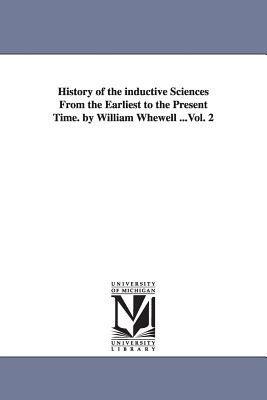
- We will send in 10–14 business days.
- Author: William Whewell
- Publisher: University of Michigan Library
- ISBN-10: 1425566618
- ISBN-13: 9781425566616
- Format: 15.6 x 23.4 x 3.3 cm, minkšti viršeliai
- Language: English
- SAVE -10% with code: EXTRA
History of the inductive Sciences From the Earliest to the Present Time. by William Whewell ...Vol. 2 (e-book) (used book) | bookbook.eu
Reviews
Description
A central figure in Victorian science, William Whewell (1794 1866) held professorships in Mineralogy and Moral Philosophy at Trinity College, Cambridge, before becoming Master of the college in 1841. His mathematical textbooks, such as A Treatise on Dynamics (1823), were instrumental in bringing French analytical methods into British science. This three-volume history, first published in 1837, is one of Whewell's most famous works. Taking the 'acute, but fruitless, essays of Greek philosophy' as a starting point, it provides a history of the physical sciences that culminates with the mechanics, astronomy, and chemistry of 'modern times'. Volume 2 focuses on the rise and development of modern mechanics in the seventeenth century. Whewell shows how Galileo's laws of motion exemplify a paradigmatic shift from 'formal' to 'physical' sciences - a new approach concerned with explaining causes rather than merely observing phenomena. It also discusses the implications for physical astronomy of Newton's discoveries."
EXTRA 10 % discount with code: EXTRA
The promotion ends in 22d.08:38:39
The discount code is valid when purchasing from 10 €. Discounts do not stack.
- Author: William Whewell
- Publisher: University of Michigan Library
- ISBN-10: 1425566618
- ISBN-13: 9781425566616
- Format: 15.6 x 23.4 x 3.3 cm, minkšti viršeliai
- Language: English English
A central figure in Victorian science, William Whewell (1794 1866) held professorships in Mineralogy and Moral Philosophy at Trinity College, Cambridge, before becoming Master of the college in 1841. His mathematical textbooks, such as A Treatise on Dynamics (1823), were instrumental in bringing French analytical methods into British science. This three-volume history, first published in 1837, is one of Whewell's most famous works. Taking the 'acute, but fruitless, essays of Greek philosophy' as a starting point, it provides a history of the physical sciences that culminates with the mechanics, astronomy, and chemistry of 'modern times'. Volume 2 focuses on the rise and development of modern mechanics in the seventeenth century. Whewell shows how Galileo's laws of motion exemplify a paradigmatic shift from 'formal' to 'physical' sciences - a new approach concerned with explaining causes rather than merely observing phenomena. It also discusses the implications for physical astronomy of Newton's discoveries."


Reviews